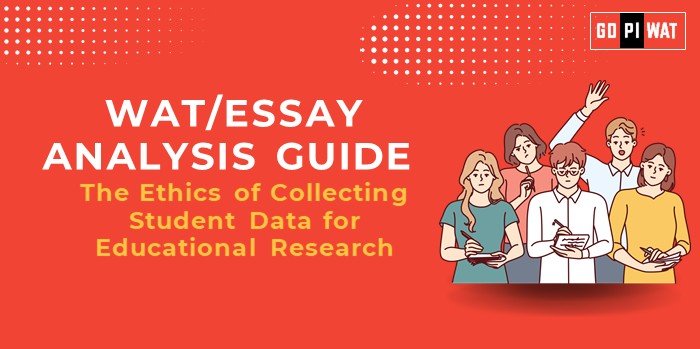📋 WAT/Essay Analysis Guide: The Ethics of Collecting Student Data for Educational Research
🌐 Understanding the Topic’s Importance
The topic bridges technology, ethics, and education—core themes in business school discourse. Its relevance extends to data-driven decision-making, policy formulation, and corporate responsibility. Ethical considerations are critical as education systems increasingly rely on student data to drive innovation.
⏳ Effective Planning and Writing
- 📝 Time Allocation:
- ⏳ Planning: 5 minutes
- ✍️ Writing: 20 minutes
- 🔍 Review: 5 minutes
🖊️ Introduction Techniques for Essays
- 🔀 Contrast Introduction: “While data empowers educators to innovate, breaches like [case example] highlight vulnerabilities, questioning the ethics of such practices.”
- 💡 Solution-Oriented Start: “With student data increasingly shaping education, ethical frameworks and regulations are imperative to protect stakeholders.”
🗂️ Structuring the Essay Body
🏆 Achievements
- 🎓 Personalized Learning: Data allows educators to tailor experiences to individual student needs, improving engagement and outcomes.
- 🌍 Successful Models: Countries like Finland ethically use data to optimize learning while maintaining student privacy.
- 📈 Policy Formulation: Data helps policymakers identify gaps, allocate resources effectively, and improve education quality.
⚠️ Challenges
- 🔐 Data Privacy Risks: Data breaches can expose sensitive information, damaging trust and safety.
- ⚖️ Bias in Predictive Models: Algorithms may reinforce existing biases, leading to unfair educational outcomes.
- 💢 Long-Term Trust Issues: Unauthorized data usage can undermine confidence in educational institutions.
🔮 Future Outlook
- 🛡️ Blockchain Integration: Using blockchain technology for secure, tamper-proof data storage ensures privacy and trust.
- 📃 Transparent Consent Mechanisms: Students and parents should have clear, informed control over how data is collected and used.
- 🌐 Global Regulations: Frameworks like GDPR provide blueprints for balancing innovation with ethical standards.
🗯️ Concluding Effectively
⚖️ Balanced Approach
“The promise of student data in revolutionizing education must not overshadow the necessity for stringent ethical practices.”
🌍 Global Comparison
“By emulating GDPR’s robust framework, education systems worldwide can harmonize innovation with ethics.”
✍️ Sample Short Essays
⚖️ Balanced Perspective (100 words)
“The ethical collection of student data in education is both an opportunity and a challenge. While tailored learning and policy insights improve outcomes, breaches and bias highlight vulnerabilities. Adopting robust consent mechanisms and regulatory frameworks ensures a balance between innovation and privacy.”
💡 Solution-Oriented (100 words)
“Student data drives innovation in education, yet its collection raises ethical questions. Solutions like anonymized data collection, blockchain for secure storage, and transparent policies can protect privacy. Aligning these measures with education goals ensures both progress and trust.”
🌍 Global Comparison (100 words)
“Countries like Finland demonstrate the benefits of ethical data use in education, while cases like Cambridge Analytica underline the risks. A balanced approach, drawing from GDPR’s example, can help nations achieve educational transformation without compromising ethics.”
🚀 Connecting with B-School Applications
- 🌍 Real-World Applications: Explore projects on ethical AI, data governance frameworks, and privacy compliance in EdTech.
- 💬 Sample Interview Questions:
- 💡 “How can educational institutions balance innovation with student data privacy?”
- 💡 “Discuss the role of regulations like GDPR in shaping ethical data usage in education.”
- 🚀 Insights for B-School Students:
- ✨ Understand data-driven decision-making processes and ethical compliance frameworks.
- 📊 Study global case studies where technology-driven education aligns with privacy standards.


